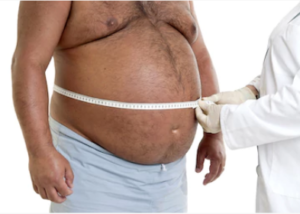
Exercise is great for any body, thin or obese.
But an obese person is NOT healthy just because she or he exercises.
One day on the “Dr. Drew” show, Jeannette DePatie, a NAAFA member who was leading exercise classes for the obese a that time, stated that fat people can be healthy as long as they focus on doing healthy things rather than on their size.
In the show she pointed out that the obese people in her aerobics exercise classes, over time, improved their mobility.
As a former personal trainer, I’ll agree that exercise improves ANYONE’s mobility — as I saw this occur with my clients who had compromised mobility.
This includes an obese older woman who had painful osteoarthritis in her knees.
According to DePatie’s reasoning, a smoker or heavy drinker can become “healthy” by taking aerobics classes.
Certainly, their mobility and stamina will improve, but unfortunately, the dangerous effects of smoking and drinking will still occur to the organs.
Obesity, too, has a negative effect on the organs, namely the heart.
Obesity Is an Independent Risk Factor for Disease

Shutterstock/Motortion Films
“Exercise can certainly help an obese person — it can improve heart health and keep a person more limber,” says Susan L. Besser, MD, with Mercy Medical Center, Baltimore, and Diplomate American Board of Obesity Medicine and board certified by the American Board of Family Medicine.
“But it doesn’t do anything about the long-term negative effects of the obesity — like damage to the internal organs (heart, liver, lungs, pancreas and so on) or damage to the joints from the added stress of having to move all that extra weight.
“Bottom line — certainly exercise, but work on losing the weight too.”
Let us not equate the term “better health” with “healthy.” They are not one and the same. They have two different meanings.
Exercise classes, gym workouts, walking and eating healthier will not undo the intrinsic hazards that obesity inflicts on the body if the fat remains.
The organs will still suffer, even if a 300 pound woman has hired a personal trainer and is now doing the battle rope exercise.
The hope is that her new exercise regimen and better eating habits will result in at least a 120 pound weight loss.
She should not become content with her 300 pound body just because she’s doing box squats combined with an overhead dumbbell press.
- The only way to undo the effects of obesity is to lose excess body fat.
- Therefore, the individual absolutely must focus on losing fat.
I’d like to see more obese men and women working out in the gym, particularly in the free weight area.
But don’t let regular exercise sessions make you complacent about your plus-size body, either.
An obese man or woman STILL needs to lose weight, even if they’re hitting the gym seven days a week — even if your “numbers” are normal.
A UCLA study that analyzed over 136,000 patients (American Heart Journal, Jan. 2009) noted that 75 percent of people hospitalized for heart attack had a normal cholesterol profile.
Often, obese people cite their normal blood numbers as proof they are healthy.
There are many risk factors for heart disease. Obesity is one of them. Exercise does not cancel out the risk-factor nature of excessive body fat when it comes to heart and other organ health.
 Dr. Besser provides comprehensive family care, treating common and acute primary conditions like diabetes and hypertension. Her ongoing approach allows her the opportunity to provide accurate and critical diagnoses of more complex conditions and disorders.
Dr. Besser provides comprehensive family care, treating common and acute primary conditions like diabetes and hypertension. Her ongoing approach allows her the opportunity to provide accurate and critical diagnoses of more complex conditions and disorders.
 Lorra Garrick is a former personal trainer certified through the American Council on Exercise. At Bally Total Fitness she trained women and men of all ages for fat loss, muscle building, fitness and improved health.
Lorra Garrick is a former personal trainer certified through the American Council on Exercise. At Bally Total Fitness she trained women and men of all ages for fat loss, muscle building, fitness and improved health.
.









































